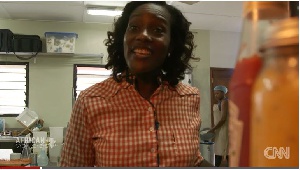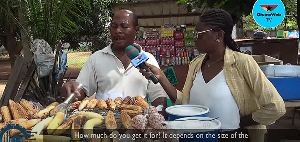Selassie Atadika wants to change the way you eat.
The UN worker-turned-chef is on course to revolutionize African cuisine through her new movement: the nomadic dining experience, which sees her encourages diners to ditch restaurants and move meals outside.
"It's about creating experiences in different locations in a way similar to my lifestyle working with the UN, but also in the context of Africa ... the Nomadic people," Atadika told CNN.
"It's I guess similar to a pop up restaurant but rather than having one fixed location, we move around and we change our menu."
New African cuisine
Midunu ("Come Let's Eat"), Atadika's company, hosts Nomadic dinners every other month where diners can enjoy a four course meal in various locations across Accra.
The menu is made up of what Atadika describes as 'New African cuisine,' which celebrates Africa's culinary heritage by putting a modern spin on traditional foods from across the continent.
"I love re-introducing people to food that they know but in a new way," Atadika explains. "I've had clients who are not familiar with Ghanaian food or who have heard of certain parts or certain types of dishes and have never tried it, have never been willing to try it until they tried it with me so it's actually just kind of opening people's eyes to something."
Expressing Ghanaian heritage
Atadika always had a passion for food and as a child 'used to follow everyone around the kitchen.'
Growing up in New York her food served as not only as an expression of her Ghanaian heritage but as a way of bringing her family together.
"We always ate at home ... we'd eat together and one of the things that you always would hear was "Va midunu" which means "Come, let's eat," Atadika said.
"So it was... communal eating ... we all come together and we sit and we eat. That was always a moment in time where the family would get together."
'A cultural marker'
Atadika worked across Africa with the UN for different agencies, her humanitarian work further proved to her how food ties communities together.
"Within Africa, I met so many different people in different contexts but food was what brought us all together..." she continued.
"It was always different but there were also some commonalities ...I realised that it was a cultural marker so wherever you go, you take a little bit of your food and your culture with you."
"The Fulani people move and they move with their food and their food has found its way there, but it's also been everywhere else that they've been. So it's something that brings us together and also tells a story about where we go."
Slowing down modern life
Atadika hopes that through nomadic dining she will encourage people to preserve the bond of coming together to eat.
"We have these nomadic dinners where people who don't know each other sit together, talk and usually by the end of the night are exchanging business cards or phone numbers," she said.
"Everything has become so electronic and it's really... how do we just slow down a little bit and enjoy where we are?"
General News of Saturday, 26 November 2016
Source: cnn.com

















